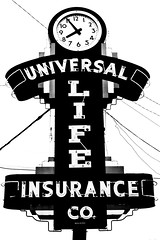4 Things to Consider When Shopping for Life Insurance
Life insurance, for most of us, is not a huge priority in our minds. Especially if you are middle aged with young children, you probably think that you have lots of time to make decisions in regards to life insurance. But the truth is that life insurance is as important for your children and spouse as is saving money for your kids’ college tuition. Here are a few things together as you shop around for a life insurance policy.
1. Don’t be fooled by whole-life insurance.
While life insurance can be fairly complicated, you should know from the get-go that life insurance falls into two major categories—term life insurance and whole life insurance. One thing that’s important to be privy to when shopping for life insurance is that whole life is almost always going to be a sucker bet. Life insurance agents get as much as 80% commission on whole life insurance, so they’ll obviously try to push these types of policies much more vociferously than term life insurance. Whole life can be fairly risky, since the policy is tied up not just in premiums you personally pay, but in investment funds as well. Since most people have so many other, more secure options to invest in, like 401ks, it’s best to separate life insurance from investment. Don’t be conned into whole life.
2. It’s not worth lying in your application to cover up health or lifestyle risks.
Unless your employer covers life insurance, most people don’t really start thinking about life insurance until they’re older and in poorer health. Of course, if you smoke, are very much overweight, have unusual or costly health problems, or your job is particularly risky, you’re going to end up paying more for your life insurance policy. Many people try lying on their applications. Perhaps they try to cover up a smoking habit. While you can probably get away with lying about smoking on a tenant application, lying about smoking for life insurance is very risky. If you are found out (and trust me, life insurance companies investigate), you can be denied coverage. Even worse, after your death, your dependents may never see a dime and may even be entangled in legal problems in the courts. Be honest.
3. Do your research.
Even for those who are experts in insurance, life insurance can be a jungle. Don’t just jump on the bandwagon with any policy or company. Spend as much time researching as you can. Read reviews, and understand precisely what you are getting yourself into. Despite my previous work experience in the insurance industry, I won’t hesitate to say that the industry is filled with scams. You’ll not necessarily get the very best deal, no matter which company and policy you decide on. But you can certainly mitigate risk by becoming as informed as you can. Spend a little time on the Internet looking for online life insurance quotes. Don’t overlook the power of knowledge.
4. The earlier you acquire life insurance, the better.
As noted earlier, most people don’t think about life insurance until they are older, just as most people don’t start investing for retirement until they are nearing the end of their careers. If you want to score an affordable policy that will fully take care of your dependents in the event that you pass away, then apply for life insurance immediately. Of course, it’s not impossible to get decent coverage in your later years, but it’ll be much more expensive, and not quite as secure.
More than even health insurance, life insurance can be very complicated. However, if you do your research and follow the above steps, you future (and the future of your loved ones) will be protected.
Related articles
- Do You Need Life Insurance? (savealittlemoney.com)
- Life Insurance Rates for Smokers Can Be Expensive (savealittlemoney.com)
- Mortgage Life Insurance – Is It Necessary? (savealittlemoney.com)
- Saving Money on Car Insurance (savealittlemoney.com)

Category: Insurance, Uncategorized







Well, you have some of your facts wrong. I am a licensed broker and I get as much as 90% commission on 30 year term products and much less on any whole life product. Also you have thoroughly confused whole life and Variable Life. Whole life has no investments bundled into them, rather this internal cash build up is based on interest and dividends (providing the company pays a dividend). AS far as 401k’s being secure, well, thats up for debate…and I am an investment adviser, so i know a little bit about macro economics.
DO the public a favor, be unbiased when you give “advice” on financial instruments…or you will come off sounding as stupid as Suzy Orman…you don’t want that do you?
Frank, thanks for the corrections and your interest to educate the readers.